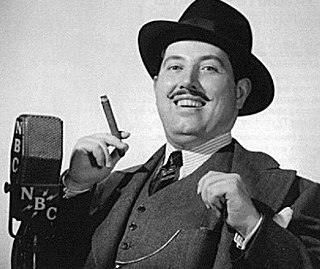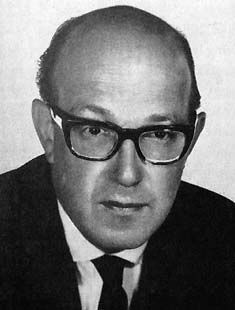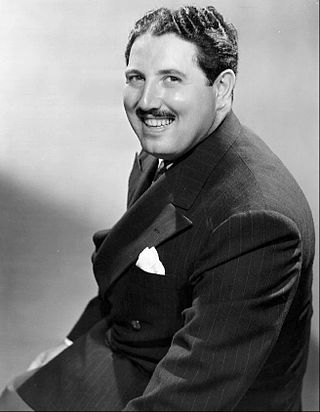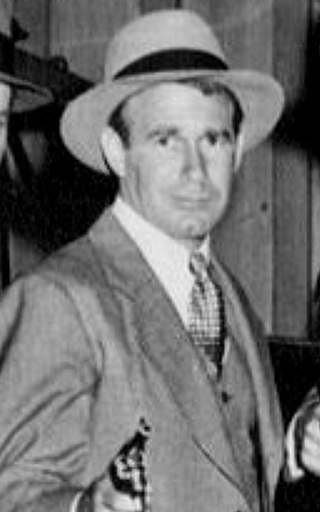
Fibber McGee and Molly (1935–1959) was a longtime husband-and-wife team radio comedy program.

The Great Gildersleeve was a radio situation comedy broadcast in the United States from August 31, 1941 to 1958. Initially written by Leonard Lewis Levinson, it was one of broadcast history's earliest spin-off programs. The series was built around Throckmorton P. Gildersleeve, a regular character from the radio situation comedy Fibber McGee and Molly. The character was introduced in the October 3, 1939, episode of that series. Actor Harold Peary had played a similarly named character, Dr. Gildersleeve, on earlier episodes. The Great Gildersleeve enjoyed its greatest popularity in the 1940s. Peary played the character during its transition from the parent show into the spin-off and later in four feature films released at the height of the show's popularity.
Pauline, Baroness de Rothschild was an American fashion designer, writer and, with her second husband, a translator of both Elizabethan poetry and the plays of Christopher Fry. She was named, with Diana Vreeland, who was added to this list in 1964, to the International Best Dressed List Hall of Fame in 1969, alongside Douglas Fairbanks, Jr., Dean Acheson, Angier Biddle Duke, Cary Grant, and Prince Philip, Duke of Edinburgh.

Jay Livingston was an American composer best known as half of a composing-songwriting duo with Ray Evans, with whom he specialized in composing film scores and original soundtrack songs. Livingston composed the music while Evans wrote the lyrics.

Harold "Hal" Peary was an American actor, comedian and singer in radio, films, television, and animation. His most memorable role is as Throckmorton P. Gildersleeve, which began as a supporting character on radio's "Fibber McGee and Molly" in 1938.

Beatrice Whitney Straight was an American theatre, film and television actress and a member of the prominent Whitney family. She was both an Academy Award and Tony Award winner, as well as an Emmy Award nominee.

Ilka Chase was an American actress, radio host, and novelist.

Willard Lewis Waterman was an American character actor in films, TV and on radio, remembered best for replacing Harold Peary as the title character of The Great Gildersleeve at the height of that show's popularity.

Belinda is the debut studio album by American singer Belinda Carlisle. It was released on May 19, 1986 by I.R.S. Records. Carlisle began work on the album in 1985 following the breakup of the Go-Go's, for whom she was the lead singer. The album was supported by four singles, with lead single "Mad About You" peaking at number 3 on the US Billboard Hot 100 and No. 1 in Canada.

Monica Pauline "Nikki" Santos Gil-Albert is a Filipino singer, actress, host, model, and video jockey. She is known for being part of the afternoon remake of Carlo J. Caparas' Pieta (2008–2009) and, in 2009, for portraying Princess Punzalan in the afternoon drama Nagsimula sa Puso (2009–2010). She is also well known for her lead portrayal as Jennifer "Jenny" La Peña in the 2012 remake of the 1990 radio serial of Salvador Royales' Mundo Man ay Magunaw, originally played by Jennifer Sevilla in the film version produced by SEIKO Films.
The Feds is a series of Australian television films starring Robert Taylor, which were first broadcast on the Nine Network 1993–1996.

Eddie Firestone, sometimes known as Eddie Firestone Jr., was an American radio, television, and film actor who accumulated over 200 total credits during his performing career.
The Wilbur Cross Medal, or Wilbur Lucius Cross Medal for Alumni Achievement, is an award by the Yale University Graduate School Alumni Association to recognize "...distinguished achievements in scholarship, teaching, academic administration, and public service..."
Also see: The ships Anne and Little James

The Harold Peary Show is a radio situation comedy broadcast in the United States September 17, 1950-June 13, 1951 on CBS. Some sources refer to the program as Honest Harold or The Hal Peary Show.

Joyce Jordan, M.D. is a 1938-1955 radio soap opera in the United States. It was broadcast on ABC, CBS and NBC at various times during the era of old-time radio.
Island Venture is an American old-time radio adventure drama. It was broadcast on CBS from November 8, 1945, until June 20, 1946
That Brewster Boy is an American old-time radio situation comedy. It was broadcast on NBC from September 8, 1941, to March 2, 1942, and on CBS from March 4, 1942, to March 2, 1945. It was also carried on 13 stations in Canada.











